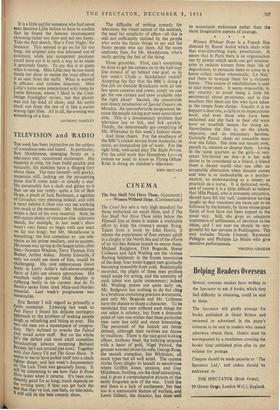CINEMA
The Sea Shall Not Have Them. (Gaumont.) —Women Without Hope. (Continentale.) The Cruel Sea sets a very high standard for those embarked on naval films, and if The Sea Shall Not Have Them sinks below the Plimsoll line at times it makes a creditable effort to ' keep the cinema's ensign flying. Taken from a book by John Harris, it relates the experiences of four airmen adrift in a dinghy in the North Sea and of the efforts of an Air-Sea Rescue launch to rescue them. Michael Redgrave, Dirk Bogarde, Bonar Colleano and Jack Watling are the victims floating helplessly in the frozen mountains of the deep, four water-logged men gradually becoming insensible from cold. Realistically recorded, the plight of these men proffers small scope for acting, and the assembly of such talent was quite unnecessary; indeed Mr. Watling passes out quite early on, Mr. Redgrave has nothing to do but cling to a briefcase containing precious documents, and only Mr. Bogarde and Mr. Colleano have the chance to shape a character. To be reminded that men suffered such things for our sakes is salutary, but from a dramatic point of view one wishes that these particular men were less cold and more interesting. The personnel of the launch are better defined, although their outlines are drawn by tradition. There is the nice good looking officer, Anthony Steel, the bullying sergeant with a heart of gold, Nigel Patrick, the grouser worried about his wife, George Rose, the seasick comedian, Ian Whittaker, all stock types but all well acted. The camera circles from dinghy to launch to aerodrome where Griffith Jones, anxious, and Guy Middleton, footling, are the chief attractions, and it gives a comprehensive picture of this easily forgotten arm of the war. Until the end there is a lack of excitement, but that too is a memorable feature of warfare, and Lewis Gilbert, the director, has done well to accentuate endurance rather than the more imaginative aspects of courage.
Women Without Hope is a French film directed by Raoul Andre which deals with that ever-absorbing topic, prostitution. It seems that in Paris there is an organisation run by priests which sends out girl mission- aries to reclaim women from their life of degradation, to persuade them to come to a home called, rather whimsically, 'Le Nid,' and there to re-equip them for a virtuous future. This course of rehabilitation is said to take three years. It seems impossible, in any country, to avoid being a little bit sentimental about prostitutes, and in this excellent film there are few who have taken to the streets from choice. Usually it is to support a dear one, a el:lid or an impecunious lover, and even those who have been reclaimed and slip back to their old ways have an unselfish reason for doing so. Nevertheless the film is, on the whole, objective, and its missionary heroine, Gabrielle Pascal, sheds no crocodile tears over the fallen. She does not mourn over, preach to, censure or despise them. Living in the same quarters as the girls—a very smart fox-furred set this—it is her sole desire to be considered as a friend, a friend from a decent world who can offer an acceptable alternative when disaster comes and who is as unshockable as a psycho- analyst, as understanding as a sinner, as practical as a nurse. It is dedicated work, and of course it is a little difficult to believe that Mlle Pascal, who is extremely attractive, should have felt the 'call,' experience having taught us that vocations are more apt to be followed by the homely, by those whose great funds of love have not been tapped in the usual way. Still, she gives an adequate impression of selflessness, of devotion to the cause, and I am sure we should be very grateful for her services in Paddington. The cast includes Nicole Courcel, Raymond Pellegrin and Philippe Le Maire who give sensitive performances.
VIRGINIA GRAHAM










































 Previous page
Previous page